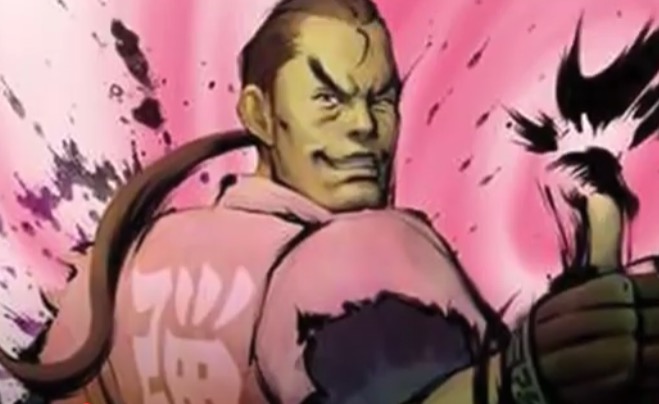'Street Fighter' Casting Raises Questions
By Romen Basu Borsellino | 08 Jul, 2025
White comedian Andrew Schulz has been cast in the role of Japanese fighter Dan Hibiki.
Comedian Andrew Schulz has made jokes about Asians being bad drivers, Asians looking alike, and China intentionally infecting the US with the “Asian Parasite.”
Now Schulz will be playing an historically Asian character in the upcoming live action “Street Fighter” movie.
Schulz will portray Dan Hibiki, a character who first appeared in the 1995 video game “Street Fighter Alpha.” Per the game’s storyline, Hibiki was born in Hong Kong to Japanese parents. He is generally a poor fighter and serves as the game’s comic relief.
Schulz was born in New York to parents of Scottish, Irish, and German descent. His career as a stand-up comic arguably exploded in 2020 when Netflix gave him a four episode-special titled “Schulz Saves America.” He also co-hosts the popular "Flagrant" podcast alongside Indian American comedian Akaash Singh.
Street Fighter’s decision to cast a White actor in a role originally conceived as Japanese raises an interesting debate. It has not been specified whether the character’s backstory will remain the same or be changed to acknowledge that Schultz is not Japanese. It’s also worth noting that the character appears light-skinned in the games.
An immediate comparison might be to HBO’s upcoming Harry Potter television series, which finds itself in the opposite situation. Emmy-nominated actor Paapa Essiedu, a Black man, was recently cast in the role of Severus Snape, which had previously been portrayed by White actor Alan Rickman. To the surprise of few, online commentators quickly began expressing their distaste for the casting decision. Jason Isaacs who acted in the original Harry Potter films has decried them as racist.
We can, of course, easily support the casting of Essiedu, beginning with the argument that Severus Snape is a made up character to begin with. No real life stories are being changed or erased.
So can the same argument not be made to defend Schulz’s casting?
It’s a little more complicated.
For one, there is a question of opportunity. Hollywood has been a predominantly White industry since its inception. While there has been a push towards inclusivity and the creation of more non-White characters, this casting decision seems to take us in the opposite direction.
As GoldSea noted in last week’s story on Asian representation in video games, modern CGI technology has struggled to successfully turn Asian actors into realistic looking video game characters, which has contributed to a lack of roles for Asian. Street Fighter, however, has been one of the more well-known franchises to revolve around mostly Asian characters.
Professional wrestler Roman Reigns, who is of Samoan descent, has been cast to play a Japanese character in the same film. While the AAPI community can still it as a win, that decision raises its own questions.
And while it's one thing to ask whether a White man should be eligible to play Hibuki, it's another to ask about Andrew Schulz specifically.
Schulz’s 2020 Netflix special, which relied heavily on pandemic material, largely made Asians the butt of his jokes. It was also during a time when bigotry and violent attacks against members of the AAPI community were spiking.
Jen Chung, co-founder of New York publication Gothamist tweeted at the time “The anti-Asian, anti-Chinese rhetoric in this “comedy” special is what makes me afraid to walk outside and take the subway.” She was not the only one to express this sentiment.
There is, of course, a greater conversation to be had around humor and the context that it's used in. And Schulz is certainly not the first successful comedian to regularly make offensive jokes about a race outside of his own. But critics of Schulz could argue that his remarks were not simply part of an onstage persona.
Schulz, alongside other prominent podcasters like Joe Rogan and Theo Von, have been described as belonging to "the manosphere,” a term which typically describes performers with male-heavy audiences who hold right wing views.
Schulz has openly discussed his support for President Trump who he hosted on his podcast in the lead up to the 2024 election. Trump has famously championed “anti-DEI” policies and spread panic over “Great replacement theory,” the accusation that minorities of taking jobs away from White people who are more deserving.
Now, the AAPI community may be within their rights to accuse Schulz of taking away a job that someone else deserved. But he might counter by arguing that he earned it on his own merits.
There is a question of opportunity. Hollywood has been a predominantly White industry since its inception. While there has been a push towards inclusivity and the creation of more non-White characters, this casting decision seems to take us in the opposite direction.

Dan Hibiki might be considered the clown prince of Street Fighter.
Articles
- Asian Refiners Struggle with Output As Mideast Supplies 60% of Asia's Oil
- Strait of Hormuz Closing Will Force Shutdown of Mideast Oil Production
- Symmetry Is Next to Godliness in Fitness
- Volvo's Fully Electric Cars Shine Against Overall Sales Slump
- Mitsubishi Heavy to Enjoy Record Year on Japan's Nuclear Reactor Restarts
Asian American Success Stories
- The 130 Most Inspiring Asian Americans of All Time
- 12 Most Brilliant Asian Americans
- Greatest Asian American War Heroes
- Asian American Digital Pioneers
- New Asian American Imagemakers
- Asian American Innovators
- The 20 Most Inspiring Asian Sports Stars
- 5 Most Daring Asian Americans
- Surprising Superstars
- TV’s Hottest Asians
- 100 Greatest Asian American Entrepreneurs
- Asian American Wonder Women
- Greatest Asian American Rags-to-Riches Stories
- Notable Asian American Professionals

